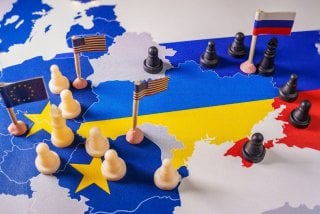Talking to Russia Isn’t Rewarding Aggression; It’s Exploiting Weakness
Negotiating with a greatly weakened adversary can allow for greater flexibility without giving the other side a potentially decisive advantage.
French president Emmanuel Macron recently declared that, while the West must ensure Ukraine’s security, “it must also envisage non-confrontation with Russia and rebuild a sustainable balance of forces.” Many foreign policy commentators lambasted Macron for his supposedly naïve and delusional remarks. Better, the counterargument goes, to simply give Ukraine what it needs to achieve total victory and cripple Russia’s military such that it cannot threaten its neighbors again anytime soon. Ukrainian president Volodymyr Zelensky himself, in an interview with the Washington Post, rejected any possibility of talks with Russia, saying, “I think it makes no sense for Ukraine to negotiate with the collective with the name ‘Putin.’”
But what if total victory proves militarily unattainable? What if the only alternative to negotiations is a bloody, protracted, frozen conflict?
The general aversion to negotiations would suggest that, if talks do occur, they should be limited in scope to avoid “rewarding” Russian aggression. This, I argue, gets the strategic calculus backward. Instead of narrow negotiations, the United States and its allies should take the broadest possible approach to any eventual talks with Russia. This promises to both maximize the West’s short-term leverage resulting from Russian weakness and could facilitate peace by allowing someone other than Ukraine to give Vladimir Putin a face-saving “win” at home.
The war has devastated Russia. Its military is decimated. Its economy, while surprisingly resilient to sanctions, will continue atrophying due to international divestment and internal corruption. These effects are compounded by an aging population and the widespread emigration of young, educated Russians.
This is a (self-inflicted) tragedy for Russia. It is also an opportunity for the West. Taking a broad view of eventual negotiations with Russia promises numerous advantages and opportunities.
First, Russia today is at its weakest point in decades. This gives Ukraine, the United States, and the West more broadly unprecedented leverage and freedom of action. Seizing this opportunity to negotiate on the broadest possible terms will maximize that tremendous, but temporary, bargaining advantage. Far from rewarding Russia, negotiating now would be exploiting its massive vulnerability. And while Ukraine’s security is a key priority, the United States should also seek to use that leverage more broadly in forging a more durable and stable regional security architecture.
Second, a broader scope for negotiations offers potentially important advantages for ending the war in Ukraine on favorable terms. Neither Kiev nor Moscow look prepared to make significant territorial concessions at present. Absent total military victory, this portends a protracted frozen conflict that serves no one’s interests. Broader negotiations would allow Washington or NATO to offer incentives that make peace more attractive to Russia, so Ukraine does not have to.
Russia’s temporary weakness allows for such flexibility without seriously undermining Western security. When negotiating with peer competitors, even small margins can matter. A fine balance often works against compromise. Negotiating with a greatly weakened adversary, however, can allow for greater flexibility without giving the other side a potentially decisive advantage. There is simply a larger margin for error and lower costs to taking risks in pursuit of a stable regional order.
To be clear, I am suggesting that the United States and its allies consider, over the long term and only in response to a significant Russian withdrawal from Ukraine, offering concessions beyond what Russia’s power warrants, much less what it deserves. This might include, for instance, a moratorium on NATO expansion. This seems morally repugnant, considering Russia’s egregious and unprovoked aggression. But in the might-makes-right realm of international politics, moralizing in the face of battlefield realities can be dangerous and counterproductive. What’s more, further NATO expansion beyond Finland and Sweden seems extremely unlikely for now, so such concessions wouldn’t really be conceding much.
The more important and realistic concern is that concessions would “reward” Russia’s atrocious behavior and encourage aggression elsewhere. On balance, however, rewards would be far outweighed by the costs Russia has already suffered in this war. Indeed, the main reason the United States should consider broad-based talks is precisely because the war has been so devastating to Russia. Negotiating while Russia is weak reduces the concessions it can hope to extract, further ensuring that the massive costs of its aggression will far outweigh the benefits.
Russia, like it or not, has a big say in the viability of any European security order. Macron is, therefore, largely right: a purely punitive approach that doesn’t consider Russia’s place in the regional order will further weaken Russia but drive it closer to China and ensure that whatever capabilities Moscow can muster will be aimed against us. A peace that achieves Russian buy-in offers better prospects for a durable, stable regional order. Renegotiating the broader regional order offers at least a chance of achieving this stability. Russia’s temporary weakness creates an opportunity to do so at a significantly reduced cost.
In sum, Russia’s weakness presents a unique opportunity to work toward a regional security order that is broadly favorable to the US, its allies, and Ukraine, but still attractive to Russia given its weakness and vulnerability. We should be prepared to grasp this opportunity if it arises.
Kyle Haynes is an associate professor of political science at Purdue University and a non-resident fellow at Defense Priorities.

